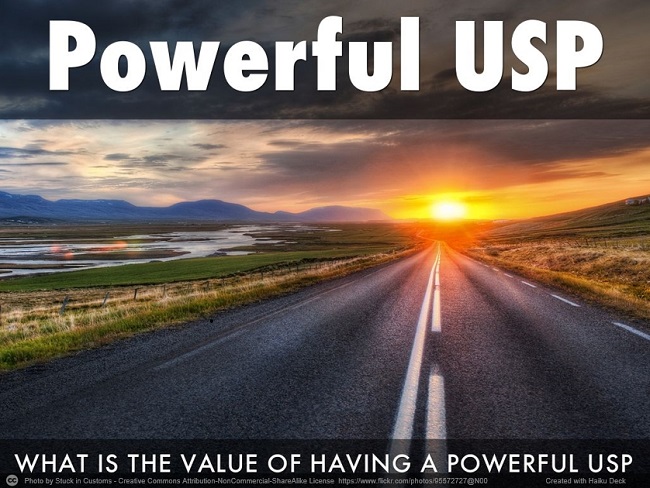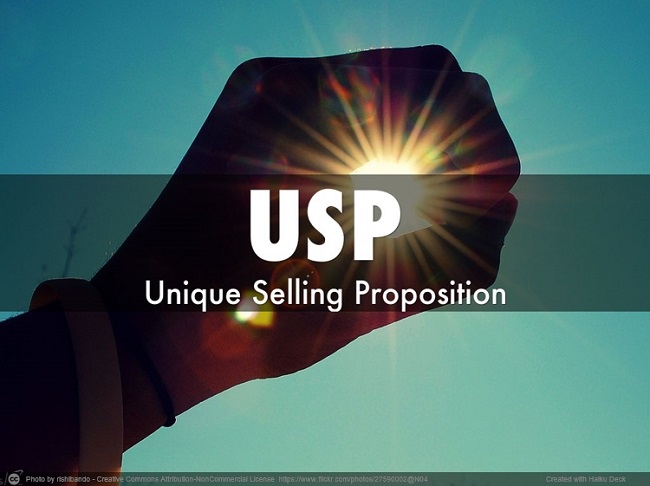強いUSPは、従業員と顧客を魅了し、そして企業を成功へと導く
“1,000 songs in your pocket.”
「ポケットに1,000曲のミュージックライブラリを」
アップル社が2001年に最初のiPodを発売したときの製品のスローガンです。

iPodの発売により、アップル社は経営の窮地から救われたといっても過言ではないでしょう。
実は、ポータブルミュージックプレイヤーはアップルのiPodが業界初ではありませんでした。
Sonyは1980年代に既にウォークマンを発売していましたし、MP3プレーヤーは少なくともiPod発売の3年前には別の会社から発売され市場に出回っていました。
しかし、なぜiPodは、発売後すぐに爆発的な売上を成せたのか。
デザイン性や機能はさることながら、何が消費者の心を魅了したのでしょうか。
その答えは、「ポケットに1,000曲のミュージックライブラリを」という強力なUSPをスローガンにしたことではないでしょうか。
製品のスローガン = USPとは限りません。
事実、多くのスローガンはUSPとはいえません。
なぜなら、多くのスローガンは広告会社によって作られたキャッチコピーであり、企業自信が考え出すUSPではないからです。
マクドナルドの事例が一番理解しやすいかと思います。
CMで良く耳にする「I’m love it」、これはマクドナルドのUSPではありませんよね。
なぜみなさんはマクドナルドに行きますか?
恐らく、マックに行けばあの味が食べれる、という保証があるからではないでしょうか。
つまり、マクドナルドが他社に負けないポイントは、全世界どこに行っても同じ味を食べれるところなのです。
「I’m love it」は、USPではありません。
なぜ多くの消費者はiPodを買ったのか。
小さくて持ち運びに便利。持っていてオシャレ。なのに、1,000曲ものミュージックライブラリになる!これですよね。
「ポケットに1,000曲のミュージックライブラリを」はスローガンでもあり、他社に負けないiPodのUSPでもあることはご理解いただけますよね?
USPとスローガンは似たようなものに見えるかも知れませんが、似て非なるものです。
ここで、もう一度以前のブログで定義したUSPについておさらいします。
USPとは、貴社が他社には絶対に負けない強み(製品やサービス)、競合他社とは相いれない製品やサービスを指します。
定義について補足すると、
・USPはスローガンではない
・USPは安易に変更するものではない。会社としてどのような存在であるか、あるいは、貴社の製品やサービスが何であるかを明示する。
・USPは消費者の求めているものであり、消費者の視点からみたWIIFM(what’s in it for me? )であること、独自性のあるベネフィット(メリット、利益)であること
アップル社の他に1000曲ものミュージックライブラリをポケットに入れて持ち歩ける製品は当時は存在していませんでした。
このスローガンは、USPはアップルのiPodにしかない独自のベネフィットです。
製品のUSPがいかに重要であるか、製品の売上に影響力があるものであるかはご理解いただけましたでしょうか?
それでは、企業のUSPとは何か、一緒に考えていきましょう。
そして企業が強いUSPを持つためには、どうすればよいか議論していきましょう。
経営層にとってのベネフィット
Fedexは自社で約650の飛行機を持っていることをご存知ですか?
参照URL:http://about.van.fedex.com/fedex_express

機体保有数でいえば、Fedexは世界で5番目に大きな航空会社です。
そんなにたくさんの飛行機を持っているのであれば乗客も乗せてしまえばもっと多くの利益がでるのではないか?
そう疑問に思われる方もいらっしゃると思います。
なぜ、乗せないのか。
なぜなら、これがFedexのUSPだからです。
Safe, reliable overnight delivery for your important packages.
「お客さまの大切なお荷物を、安全に、そして1日で確実にお届けします。」
これがFedexのUSPです。
そしてこのUSPを貫き通し、Fedexは運送業界で確固たる地位を確立し、トップに上り詰めました。
Fedexにより、今やあたりまえとなったovernight delivery market(荷物の翌日渡し)というシステムが構築されたのですからね。
Fedexは、USPにのっとり航空旅客市場には参入しません。
それがFedexが成功した秘訣です。
経営で大成するためには、USPとは何かを理解し、そして一つのことにフォーカスし、一つのことを完璧にやり遂げてください。
強いUSPがあれば、経営層は一つのゴールに向かってフォーカスできるのです。
USP以外の業務やポリシーについては拒否するという判断が出来るのです。
従業員にとってのベネフィット
従業員にとって、強く明確なUSPを掲げる企業に勤めることは大きなベネフィットです。
企業にUSPがあることで、従業員は経営層の意思決定を明確に理解することが出来ます。
従業員は、企業のUSPの理解の基に、自主性を持って業務を遂行することが出来るのです。
USPに納得していれば、組織の全体が一つのゴールに向かって業務に従事することが出来るのです。
Zapposの成功事例をご紹介いたします。

ZapposのUSPは我々にも理解できる非常に簡単なものです。
The best customer service in the universe.
「世界一の顧客サービス」
Zapposでは販売員それぞれが独自の方法で、消費者をハッピーにさせる接客をします。
Googleで「zappos customer service」と検索すると、企業のUSPの通りのたくさんの従業員の事例をご覧いただけます。
一方で、世の中には様々なトラブルを抱える企業が数多く存在しますが、それは強いUSPを掲げていなことが一つの理由と僕は考えています。
センシティブな状況や、混沌とした状況の時でも、USPを理解している従業員(経営層)は、企業のUSPに従って一貫した行動と判断をすることが出来るものです。
ステークホルダーにとってのベネフィット
強いUSPを持つことももう一つ価値は貴社のステークホルダー(株主、ローカルコミュニティ、政府機関など)に企業のビジョンを明示できることです。
ステークホルダーが貴社のUSPを知っていれば、それに対して貴社が適正なパフォーマンスを行っているか、適切な活動を行っているかを評価できるのです。
もし貴社がUSPにマッチしない経営をしていたら、ステークホルダーは株価にその評価を反映してくるでしょう。
そして、経営層は経営方法が間違っているということに気づくことが出来るのです。
結論
企業が強いUSPを持つことは、製品のUSPと同等に重要であることがご理解いただけましたでしょうか。
「経営理念」や「ミッション」よりも、USPは経営層、従業員、そしてステークホルダーに対して企業が存続する目的を明示することが出来ます。
貴社には強いUSPはありますか?そして、貴社の製品にはこれぞというUSPはありますか?
貴社のUSP、是非僕にも教えてください。
===
英文ドラフトはこちら!
Title: How a Powerful USP Can Guide Your Company, Your Employees, and Your Customers
“1,000 songs in your pocket.”
That was the Apple slogan for the first iPod back in 2001. The iPod was arguably the product that saved Apple from extinction, but the iPod certainly wasn’t the first portable music player. Sony created that with the Walkman in the 1980s. It wasn’t the first MP3 player, either. MP3 players had been introduced to the market at least three years before the iPod.
But it was this powerful slogan (and USP) that propelled Apple to the top of the market in short order. Obviously design and function had much to do with the popularity of the iPod…but “1,000 Songs in Your Pocket” is pretty hard to beat.
Now, not every slogan is a USP. As a matter of fact, most slogans are NOT unique selling propositions–they’re just something that the advertising agency (or the company president’s wife, etc.) thought was clever.
We discussed this earlier using McDonald’s as an example. “I’m Loving It” is neither unique nor a selling proposition. But what about “1,000 Songs in Your Pocket?” That is definitely BOTH a slogan and a USP.
You see, when a USP and a slogan are the same, then powerful things happen in your business. No one else besides Apple told the public that they could put 1,000 songs in their pocket. A unique benefit from owning the Apple iPod.
So, you see what a powerful USP can do for a product. What can a USP do for a company?
I would argue that a strong USP is vital for a company.
USP Benefits to Management
Did you know that FedEx has about 650 airplanes in its fleet (http://about.van.fedex.com/fedex_express)? By that measure, it’s the fifth largest airline in the world. So why doesn’t FedEx carry passengers? Because that’s not the FedEx USP.
Safe, reliable overnight delivery for your important packages.
That’s the FedEx USP. And by sticking to that USP, FedEx has built for itself the number one position in the overnight delivery market. As a matter of fact, FedEx created the overnight delivery market–again, based on this USP.
FedEx management doesn’t get into the passenger airline market because that is not their USP. Management can focus on doing one thing, one thing only, and one thing well, because they know their USP.
That’s what a strong USP can do for your company–it can keep managers focused on one goal and reject branching out into areas that aren’t in keeping with their USP.
USP Benefits to Employees
As an employee, working for a company that has a strong, clear USP is a major benefit.
Employees can frame management decisions in the context of the company’s USP. Employees can act with autonomy based on their understanding of their company’s USP. Employees can engage in their daily work, knowing that everyone in the organization is working toward the same goal–pursuing the company’s USP.
One example (although very rare, admittedly) is Zappos. The Nevada company’s USP is rather easy for an outsider to understand: The best customer service in the universe.
(I’m not sure that’s how they would state it, but nevertheless that USP reflects how Zappos operates.)
Zappos prides itself on stories where customer service representatives go out of their way–on their own–to serve customers and make them happy. Just Google “zappos customer service” and you’ll find any number of examples of employees who understand the corporate USP.
On the other hand, I could point to any number of companies that got themselves into trouble–legally or ethically–because the company didn’t have a strong USP.
When faced with confusing or delicate circumstances, employees (and managers) who can point to a strong USP will consistently make better decisions than employees who work at companies that have no guiding unique selling proposition.
USP Benefits to Stakeholders
Another valuable factor for having a strong USP is that it helps your stakeholders (shareholders, local community, government agencies, etc.) buy into your company’s vision. When stakeholders know your USP, then they can evaluate your company’s performance and actions as reflected in that USP.
And when your company does something that doesn’t match that USP, your stakeholders will let you know quickly in terms of feedback and share prices.
Conclusion
You see how a strong USP can benefit a company just as much as a strong USP benefits an individual product.
Even more than “corporate vision” or “mission” (which are usually just retreaded, feel-good corpspeak), a USP offers a definite sense of purpose for corporate management, employees, and stakeholders.
Does you company have a strong USP (in addition to USPs for your products)? Let us know what your USP is.



